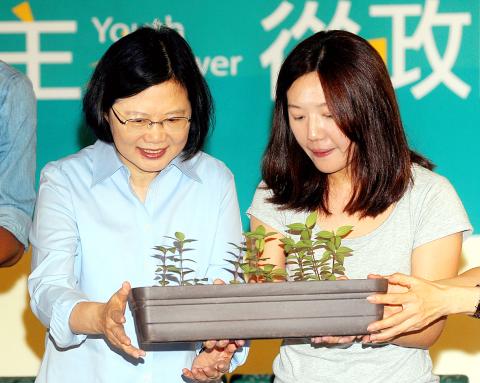The Democratic Progressive Party (DPP) yesterday announced two youth-oriented programs aimed at encouraging the young to participate in politics, which it says is crucial to deepening Taiwan’s democracy and reforming the party.
The first program, Youth Power, encourages people aged 23 to 40 to participate in the November elections for township councilors and borough and village wardens.
The second program, the Youth Council, aims to bring young people together to discuss a wide range of political issues and include those opinions in the DPP’s policymaking process.

Photo: CNA
“The key to launching these programs is to raise public awareness, in particular after the Sunflower movement, that Taiwan’s democracy should be deepened and to see whether the DPP could work with society once again,” DPP Chairperson Tsai Ing-wen (蔡英文) told a press conference yesterday.
Noting that Taiwan’s 38 years of Martial Law ended on the same day 27 years ago — July 15, 1987 — Tsai said that Taiwan’s democratization was a product of the dedication and struggle of many young and fearless politicians who are now senior DPP members.
That is why the DPP has to “reinvest” the resources that society has given the party back to the young people, she said.
Tsai added that political participation does not necessarily mean running in elections, because all forms of activities that improve people’s livelihood and civil society are just as important.
The DPP will provide candidates who pass the preliminary screening with a subsidy of NT$30,000 (US$993) as well as consultation and training in campaign strategy and agenda-setting, the DPP’s Democracy Institute deputy director Wu Pei-yi (吳沛憶) said.
In return, the candidates have to pledge that they will not buy votes and, if elected, work to ensure transparency in all their community works and promote grassroots democracy, Ho said.
The party did not set a goal on how many young candidates it would train and sponsor.
The Youth Council will serve as a longstanding platform for the DPP to exchange ideas with young people, DPP Department of Youth Development director Fu Wei-che (傅偉哲) said.
The first meeting of the council is scheduled to be held in Greater Taichung on July 26, with follow-up meetings in Greater Kaohsiung, Taoyuan County and New Taipei City, among other places, taking place every other Saturday.
Fu said the DPP plans to gather public opinions online before every meeting and present the conclusions and recommendations to the party’s Central Standing Committee — its highest decisionmaking body — for reference and further discussion.
“We are not trying to incorporate or neutralize young people’s voices with the platform. Quite the contrary, our aim is to highlight their voices and make young people the forefront of the DPP,” Fu said.
Fu and Ho, both student movement leaders, were among Tsai’s “prize recruits.” The party leader pledged a youthful movement as part of her party reform when she assumed the two-year DPP chairmanship in May, about one month after the Sunflower movement.

The manufacture of the remaining 28 M1A2T Abrams tanks Taiwan purchased from the US has recently been completed, and they are expected to be delivered within the next one to two months, a source said yesterday. The Ministry of National Defense is arranging cargo ships to transport the tanks to Taiwan as soon as possible, said the source, who is familiar with the matter. The estimated arrival time ranges from late this month to early next month, the source said. The 28 Abrams tanks make up the third and final batch of a total of 108 tanks, valued at about NT$40.5 billion

Travel agencies in Taiwan are working to secure alternative flights for travelers bound for New Zealand for the Lunar New Year holiday, as Air New Zealand workers are set to strike next week. The airline said that it has confirmed that the planned industrial action by its international wide-body cabin crew would go ahead on Thursday and Friday next week. While the Auckland-based carrier pledged to take reasonable measures to mitigate the impact of the workers’ strike, an Air New Zealand flight arriving at Taipei from Auckland on Thursday and another flight departing from Taipei for Auckland on Saturday would have to

A group from the Taiwanese Designers in Australia association yesterday represented Taiwan at the Midsumma Pride March in Melbourne. The march, held in the St. Kilda suburb, is the city’s largest LGBTQIA+ parade and the flagship event of the annual Midsumma Festival. It attracted more than 45,000 spectators who supported the 400 groups and 10,000 marchers that participated this year, the association said. Taiwanese Designers said they organized a team to march for Taiwan this year, joining politicians, government agencies, professionals and community organizations in showing support for LGBTQIA+ people and diverse communities. As the first country in Asia to legalize same-sex

MOTIVES QUESTIONED The PLA considers Xi’s policies toward Taiwan to be driven by personal considerations rather than military assessment, the Epoch Times reports Chinese President Xi Jinping’s (習近平) latest purge of the Chinese People’s Liberation Army (PLA) leadership might have been prompted by the military’s opposition to plans of invading Taiwan, the Epoch Times said. The Chinese military opposes waging war against Taiwan by a large consensus, putting it at odds with Xi’s vision, the Falun Gong-affiliated daily said in a report on Thursday, citing anonymous sources with insight into the PLA’s inner workings. The opposition is not the opinion of a few generals, but a widely shared view among the PLA cadre, the Epoch Times cited them as saying. “Chinese forces know full well that